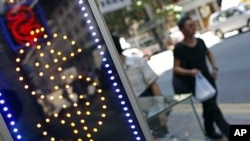Countries around the world trying to assess the impact of the U.S. credit downgrade on the global economy are starting to speak out.
China issued a stern warning to the United States Saturday, criticizing the country's "debt addiction" and saying Washington needs to understand it can no longer borrow its way out of economic problems.
The commentary by communist China's official Xinhua news agency condemned the U.S. for what it called "short-sighted political wrangling," and said the world needs a new, stable global reserve currency.
China's central bank is the largest holder of U.S. public debt.
Other countries are reacting more cautiously. Japan, the second largest U.S. creditor, said Saturday the lower rating would not affect Tokyo's approach to investing in U.S. debt. South Korea put the downgrade on the agenda for a meeting Sunday of its central bank officials, but along with Australia urged against an overreaction.
India, one of the world's top emerging economies, called America's downgraded credit rating a "grave" situation. Finance Minister Pranab Mukherjee refused to comment further, saying more analysis was needed.
Russia said Saturday it would keep its investments in U.S. debt stable, saying there was not much difference between a AAA and a AA+ rating.
In an interview Saturday, French Finance Minister Francois Baroin also voiced support for the U.S., saying France had faith in Washington's ability to right its economy. But Europe is also trying to confront its own economic woes, with Italy and Spain facing growing debt problems.
Officials with the Group of Seven, which represents the world's top industrial economies, said Saturday finance ministers planned to talk by phone over the coming days to discuss both the U.S. credit downgrade and and eurozone debt crisis.
Despite the official reactions, some economists say what happens next may depend on what investors do when the Asian stock markets reopen on Monday.
Asia's benchmark indexes, Tokyo's Nikkei index and Hong Kong's Hang Seng, plunged 3.7 percent and 4.3 percent respectively at the close of trade Friday.
Some information for this report was provided by AP and Reuters.




